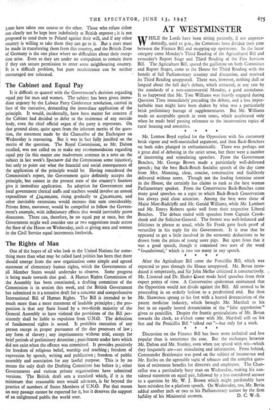AT WESTMINSTER
WHILE the Lords have been sitting patiently, if not unprece- dentedly, until rr p.m., the Commons have divided their time between the Finance Bill and mopping-up operations. In the latter category came Monday's Third Reading of the Agricultural Bill and
yesterday's Report Stage and Third Reading of the Fire Services Bill. The Agriculture Bill, spared the guillotine on both Committee and Report Stages, came to the House for Third Reading with the benefit of full Parliamentary scrutiny and discussion, and received its Third Reading unopposed. There was, however, nothing dull or languid about the full day's debate, which attracted, at any rate by the standards of a non-controversial Monday, a good attendance. It so happened that Mr. Tom Williams was heavily engaged during Question Time immediately' preceding the debate, and a less imper- turbable man might have been shaken by what was a particularly brisk preliminary barrage of supplementaries. But Mr. Williams made an acceptable speech in even tones, which accelerated only when he made brief passing reference to the inconvenient topics of rural housing and amenities. * •* * * Mr. Lennox Boyd replied for the Opposition with his customary brisk vigour and well-marshalled argument, and then Back-Benchers on both sides plunged in enthusiastically. There was perhaps not a great deal of debating in the strict sense, but there were a number of interesting and stimulating speeches. From the Government Benches, Mr. George Brown made a particularly well-delivered speech ; but the best Back-Bench Socialist speech of the day came from Mrs. Manning, clear, concise, constructive and faultlessly delivered without notes. Though not the leading feminine orator in the House, she certainly has claims to rank as the best woman Parliamentary speaker. From the Conservative Back-Benches came many good speeches on a topic to which Back-Bench Conservatism has always paid close attention. Among the best were those of Major Mott-Radclyffe and Mr. Gerald Williams, while Mr. Lambert and Mr. Emrys Roberts spoke well from their respective Liberal Benches. The debate ended with speeches from Captain Crook- shank and the Solicitor-General. The former was well-balanced and felicitous in phrase as usual, while Sir Frank gave fresh • proof of versatility in his reply for the Government. It is true that he appeared to get a little involved in the economic deductions to be drawn from the prices of young store pigs. But apart from that it was a good speech, though it contained two uses of the word " foundational,' which is two too many in any speech. * * * * After the Agriculture Bill came the Penicillin Bill, which was expected to pass through the House unopposed. Mr. Bevan intro- duced it temperately, and Sir John Mellor criticised it constructively. Mr. Linstead and Dr. Haden Guest made brief speeches from their expert points of view. A Conservative spokesman announced that the Opposition would not divide -against the BilL All seemed to be proceeding in an orderly fashion to a predestined end. But then Mr. Shawcross sprang to his feet with a heated denunciation of the
patent medicine industry, which brought Mr. Marshall to his feet in an equally heated denunciation of the "false approbation "
given to penicillin. Despite the frantic gesticulations of Mr. Bevan towards the clock, to o'clock came with Mr. Marshall still on his feet and the Penicillin Bill " talked out "—but only for a week.
* * * • * Discussion on the Finance Bill has been more technical and less popular than is sometimes the case. But the exchanges between Mr. Dalton and Mr. Stanley, even when not spiced with wit—which they frequently are—are stimulating and informative. From behind, Commander Braithwaite was good on the subject of income-tax and Mr. Eccles on the agreeable topic of tobacco and the complex ques- tion of retirement benefits for directors and employees. The Chan- cellor was a particularly busy man on Wednesday, making his con- sidered statement on equal pay, followed by a less considered answer to a question by Mr. W. J. Brown which might pardonably have been mistaken for a platform speech. On Wednesday, too, Mr. Bevin added another inch or two to his Parliamentary stature by the firm


































 Previous page
Previous page